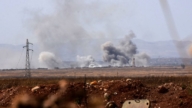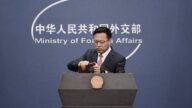【新唐人2011年4月21日訊】阿拉伯半島電視臺駐北京分社社長伊扎特,最近在網上發表了《阿拉伯人對中國媒體的十萬個為甚麼》一文,在網上引起了一場關於官方媒體報導方式,以及公信力的爭論。究竟阿拉伯人對中國媒體提出了甚麼質問呢?請看報導。
中國媒體在報導阿拉伯民主革命的方向和立場,不僅讓中國民眾反感,也引發了國際上的批評。伊扎特在這篇博文中,尖銳的批評中國媒體在阿拉伯問題上“刻意誤導”民意。
伊扎特在博文中寫道:“當前發生在阿拉伯世界的革命——我更願意把它稱為變革,阿拉伯革命作為一起全方位多層面的變革,本身就是最具價值的新聞。在這場波及到所有街道,動員了老少婦孺的歷史性運動中,阿拉伯人得到了正義的支持,卻被中國媒體誤讀了。”
伊扎特在文章中指出,在對利比亞的報導上,中國(共)媒體的立場和口徑,很少報導卡扎菲對人民兇殘橫暴的鎮壓和屠殺。中國(共)媒體的記者,跟著卡扎菲的手下到他們安排的街道、醫院、學校參觀採訪,而在反對派大本營重要的發佈會上,很難看到中國記者的身影。
伊扎特寫道:一家外國媒體刊登的《中國媒體的鴕鳥政策》一文指出,大部分中國媒體的報導集中在實際的衝突,以及西方如何“攻擊”利比亞的。與之相比,對於卡扎菲的政權是如何分裂的?利比亞長期以來的政治現狀,以及為甚麼如此多的民眾對統治者不滿等等的報導,卻寥寥無幾。
伊扎特表示,不理解一家媒體花那麼多錢,做那麼周密的準備,派自己的記者到危險的利比亞的目地是甚麼?他說,中國記者在連線中不斷強調:大部分利比亞人都支持卡扎菲,可是,卻把廣場和街道上的反對派們當作「飛仙」,無視他們的存在!
伊扎特在「十萬個為甚麼」中還問道,中國媒體告訴我們卡扎菲的部隊如何如何將反對派擊潰,接連收復失地,卻不告訴我們:替卡扎菲殺掉他的人民的有幾萬殺人不眨眼的外國僱傭軍!
《德國之聲》電臺表示,中共官媒受到這樣直言不諱的批評並非罕見。不過,這一次提出批評的是,被中國(共)官方暗中視為學習榜樣的“東方媒體”—-半島電視臺的駐京分社社長。
網路上對於伊扎特的這篇博文,在回覆的留言中有人寫道:“謝謝你能夠提供給中國人民一面全新的鏡子,讓中國人民除了那些喉舌媒體的一面之辭外,能夠看到不一樣的論點。”
也有人談到:“我相信您應該了解,在中國,每一級政府裡都有著這樣一個機構叫宣傳部,而他們每天要做的事就是統一口徑,按照中央的意見,把各種宣傳要求發送到各大小報紙、電臺、和電視臺去。”
據了解,中共政府已經啟動了450億人民幣「改善」國際形象,推動官方媒體向國際擴張,以爭取國際話語權。
伊扎特認為,中國媒體在國際上的聲音並不存在,造成這種現狀的原因,就是中國(共)媒體缺乏自身的公信力。這些媒體在國內都得不到信任,怎麼能在國際上受到尊重?
伊扎特同時指出,在國外,公信力就如同媒體的生命力,沒有公信力的媒體最終會走向倒閉。伊扎特希望,不要對“一邊倒”的中共官媒聽之任之,因為,這涉及的是媒體的責任和義務。
新唐人記者唐睿、王明宇綜合報導。
Al Jazeera: Arabs’ 100,000 Questions for Chinese Media
Ezzat Shahrour, Chief correspondent of Al-Jazeera’s
Arabic in Beijing, speaks about the Chinese media
in his recent Chinese blog post “The Arab People
Have 100,000 Questions for Chinese Media,"
which triggered heated discussion
on China’s state-run media and itscredibility.
Shahrour strongly criticizes in his post
the lopsided coverage of the Chinese media
on the uprisings in the Arabic world, calling it
“intentional misreading of the popular will."
Shahrour writes: “The current revolution
in the Arab world is an omni-directional
and multi-level reform. It is newsworthy in itself.
In this widespread and deep-reaching movement,
the Arab people have justice on their side,
but are misread by the Chinese media."
Shahrour points out Chinese media reports seldom
report the killing of Libyans by Gaddafi’s regime.
“Chinese journalists accompany Gaddafi loyalists
on streets, hospitals and schools that have been
prearranged for the convenience of their reporting…
but it’s hard to find them at important
press conferences given by the opposition party."
“The Chinese media has mostly been reporting
on the actual conflict and how the West
is ‘attacking’ Libya. In contrast, there has been
little analysis on the political issues of Libya,
including how Gaddafi’s government is falling apart,
the country’s long-term political outlook, and why
many Libyans are so unhappy with their ruler,"
said Shahrour in his blog post, citing the article
“Chinese Media’s Ostrich Policy."
“I just don’t see what the point is of media
spending so much money to prepare their journalists
to go to a dangerous place like Libya,"
says Shahrour. “The Chinese reporters
constantly emphasize that the majority of Libyans
support Gaddafi, so I suppose those opposition
members who are gathering daily
on the streets and in public squares
must be from some fairy wonderland?"
“The Chinese media tell us how Gaddafi’s forces
are gaining ground on the opposition forces,
but they don’t tell us that there are
tens of thousands of foreign mercenaries
killing Libyan people at Gaddafi’s behest."
According to Deutsche Welle, China looks up
to the Qatar-based Al Jazeera network as a model
of how non-Western media can win global prominence.
Therefore Shahrour’s words carry a special weight.
A comment to Shahrour’s blog post says:
“Thank you for giving Chinese people a new mirror,
so that they can see a view different from the one
created by the state-run media."
Another comment says: “I believe you know in China,
there are propaganda departments in governments
of all levels. And what they do all day is to pass
the requirements of the party to various media."
China has approved RMB45 billion in budget
to “improve" its international image and to
expand the global influence of its state run media.
Shahrour believes that Chinese media does not have
a voice, because of its lack of credibility.
“They are not trusted in China,
how can they be respected internationally?"
Shahrour points out that credibility
is what gives a media its life.
“Media have responsibility and an obligation
to report events comprehensively."
NTD reporters Tang Rui and Wang Mingyu.





























